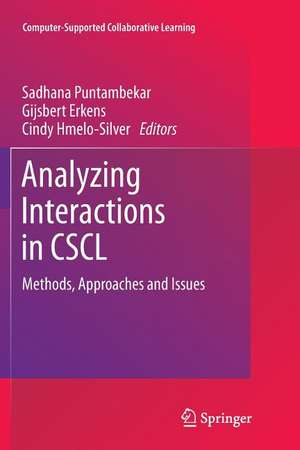Analyzing Interactions in CSCL: Methods, Approaches and Issues: Computer-Supported Collaborative Learning Series, cartea 12
Editat de Sadhana Puntambekar, Gijsbert Erkens, Cindy Hmelo-Silveren Limba Engleză Paperback – 25 ian 2013
CSCL research tends to span across several disciplines such as education, psychology, computer science and artificial intelligence. As a result, the methods for data collection and analysis are interdisciplinary, from fields such as sociology, anthropology, psychology, computer science, and artificial intelligence. This book brings perspectives together, and provides researchers with an array of methodologies to document and analyze collaborative interactions.
| Toate formatele și edițiile | Preț | Express |
|---|---|---|
| Paperback (1) | 951.29 lei 6-8 săpt. | |
| Springer Us – 25 ian 2013 | 951.29 lei 6-8 săpt. | |
| Hardback (1) | 957.44 lei 6-8 săpt. | |
| Springer Us – 22 dec 2010 | 957.44 lei 6-8 săpt. |
Din seria Computer-Supported Collaborative Learning Series
- 15%
 Preț: 659.53 lei
Preț: 659.53 lei - 15%
 Preț: 648.42 lei
Preț: 648.42 lei -
 Preț: 387.38 lei
Preț: 387.38 lei - 18%
 Preț: 1832.53 lei
Preț: 1832.53 lei - 15%
 Preț: 642.83 lei
Preț: 642.83 lei - 18%
 Preț: 1135.35 lei
Preț: 1135.35 lei - 18%
 Preț: 949.55 lei
Preț: 949.55 lei - 18%
 Preț: 1021.68 lei
Preț: 1021.68 lei - 18%
 Preț: 1398.94 lei
Preț: 1398.94 lei - 18%
 Preț: 1241.25 lei
Preț: 1241.25 lei - 15%
 Preț: 639.73 lei
Preț: 639.73 lei - 15%
 Preț: 645.28 lei
Preț: 645.28 lei - 18%
 Preț: 953.20 lei
Preț: 953.20 lei - 18%
 Preț: 955.25 lei
Preț: 955.25 lei - 18%
 Preț: 1116.09 lei
Preț: 1116.09 lei - 15%
 Preț: 646.11 lei
Preț: 646.11 lei - 15%
 Preț: 641.03 lei
Preț: 641.03 lei
Preț: 951.29 lei
Preț vechi: 1160.10 lei
-18% Nou
Puncte Express: 1427
Preț estimativ în valută:
182.02€ • 190.56$ • 150.62£
182.02€ • 190.56$ • 150.62£
Carte tipărită la comandă
Livrare economică 07-21 aprilie
Preluare comenzi: 021 569.72.76
Specificații
ISBN-13: 9781461427889
ISBN-10: 1461427886
Pagini: 440
Ilustrații: XXII, 416 p.
Dimensiuni: 156 x 235 x 23 mm
Greutate: 0.61 kg
Ediția:2011
Editura: Springer Us
Colecția Springer
Seria Computer-Supported Collaborative Learning Series
Locul publicării:New York, NY, United States
ISBN-10: 1461427886
Pagini: 440
Ilustrații: XXII, 416 p.
Dimensiuni: 156 x 235 x 23 mm
Greutate: 0.61 kg
Ediția:2011
Editura: Springer Us
Colecția Springer
Seria Computer-Supported Collaborative Learning Series
Locul publicării:New York, NY, United States
Public țintă
ResearchCuprins
Introduction: Documenting and Analyzing CSCL Interactions.- Part 1: Understanding Group Processes.- A Complexity-Grounded Model for the Emergence of Convergence in Group Discussions.- Analyzing Collaborative Interactions with Data Mining Methods for the Benefit of Research and Learning.- Contextual Perspective in Analyzing Students’ Collaborative Activity in CSCL Contexts.- A Collaborative Analysis and Visualization Platform for Theory Building and Pedagogical Support in Knowledge Building.- Representational Tools for Understanding Complex Computer-Supported Collaborative Learning Environments.- How to Study Group Cognition.- Commentary: Issues in Analyzing and Documenting Group Processes.-Part 2: Individual Learning within Groups.- Analyzing the L in CSCL.- Analyzing Collaborative Learning Through Hierarchical Linear Modeling.- Quantifying Qualities: Multi-Dimensional Analyses of Text-Based Communication in CSCL.- Using Multilevel Analysis in CSCL Research.- Assessing Argumentation in CSCL: Goals, Structures and Functions.- Commentary: Role of Individual Learning and Group Processes in CSCL.- Part 3: Frameworks for Analyzing CSCL.- An Interaction-Aware Design Process for the Integration of Interaction Analysis in Mainstream CSCL Practices.- Towards an Automatic Measure of Transactivity in On-line Discussions.- Analyzing Collaborative Interactions in Multiple Science Learning Contexts.-An Analytic Framework for Conceptualizing and Representing Distributed Mediated Interaction.- Analyzing Collaborative Interactions Across Domains and Settings: An Adaptable Rating Scheme.- Commentary: Analyzing Group Interactions Design of CSCL Systems.-Concluding Commentary: Issues and Dilemmas in Analyzing Learning and Collaboration.
Textul de pe ultima copertă
Analyzing Collaborative Interactions in CSCLMethods, Approaches, and IssuesSadhana Puntambekar, Gijsbert Erkens, and Cindy Hmelo-Silver, editorsIn more than two decades of research in CSCL (Computer-Supported Collaborative Learning), researchers have used several methods to understand how individuals learn in groups and how groups of learners construct knowledge. The individual and group learning processes have been studied using a variety of methods.Analyzing Collaborative Interactions in CSCL reveals the wide range of this research: qualitative and quantitative methods, studies of the learning process as well as outcomes, and the measurement of group and individual members’ learning. Focusing on three major research areas—group processes, learning within groups, and frameworks for analyzing CSCL—leading scholars present models, methods, and tools that readers can adapt to fit their own projects. Basic research issues such as defining the unit of analysis, determining the grain size of the data, and representing the temporality of interactions are discussed in the context of these methods addressing issues such as:•Studying group cognition through the lens of social order.•Using visualization methods to assess group members’ individual progress.•Analyzing collaborative interactions with data mining methods.•Assessing student project groups online and offline.•Using multilevel analysis in text-based communication.•Analyzing collaborative interactions across settings and domains. Together, the chapters in Analyzing Collaborative Interactions in CSCL model a range of methods for CSCL researchers in education, education technology, and cognitive science.
Caracteristici
Synthesizes and analyzes interactions within CSCL Provides alternative methodologies for researchers in the CSCL field Addresses unique needs of CSCL researchers Includes supplementary material: sn.pub/extras



